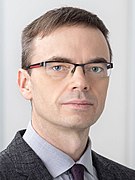Progressive Alliance (Alsland)
This article is incomplete because it is pending further input from participants, or it is a work-in-progress by one author. Please comment on this article's talk page to share your input, comments and questions. Note: To contribute to this article, you may need to seek help from the author(s) of this page. |
Progressive Alliance Progressyf Alliânsje Progressive Allianz Progrvẹrcic Vyncynn Progressiivne liit | |
|---|---|
 | |
| Abbreviation | PA PV (Fawkhamshire and Hamptonshire) PL (Martiland) |
| Leader | Ottila Möller (Social Democratic Alliance) |
| Founded | August 14, 1956 (United Socialist Front) March 28, 1958 (Alliance for Alslandic Socialism) February 9, 2003 (Progressive Alliance) |
| Headquarters | Yndyk |
| Ideology | Social Democracy Democratic Socialism Pro-Eucleanism Minority politics Factions: Centrism Left-wing nationalism |
| Political position | Centre-left to left wing |
| Euclean Parliament group | SAE (SdA, SDyD, SP) AFRE (KPP) |
| Colors | Red |
| Slogan | "For all Mankind" |
| Members | |
| Folkssenaat | 93 / 231
|
| Members of the Federal Presidency | 2 / 4
|
| Euclean Parliament | 9 / 24
|
| Election symbol | |
| File:S v1.svg | |
| Website | |
| progressyfalliânsje | |
The Progressive Alliance (Dellish: Progressyf Alliânsje, Weranian: Progressive Allianz, Swathish: Progrvẹrcic Vyncynn, Kirenian: Progressiivne liit), formerly the Alliance for Alslandic Socialism is a Political alliance in Alsland formed by the Social Democratic Alliance, Social Democrats in Delland, Socialist Party and the Radical Front in 1956 to contest the 1957 Alslandic legislative election.
The alliance is one of three political alliances in Alsland with the other being the National Bloc and Together for the Republic. Each bloc is seen as political opponents to each other. Members of the alliance agree not to stand candidates in provinces which another member party stands candidates in.
History
Founding
With the 1956 General election approaching, Premier Witte Reitsma met with other centre-left and left wing political leaders in an attempt to maximise left-wing representation in the Folkssenaat. An informal alliance already existed between the Socialist Party which was at the time a federal party and the Social Democrats in Delland who had cooperated after the resignation of Samuel Hudson.
After meeting with the leaders of the Social Democratic Alliance, Socialist Party, Alslandic Section of the Worker's International and the Radical Front, Reitsma announced the creation of the 'United Socialist Front'. In the election the alliance won 2/3rds of all seats in the Folkssenaat.
Following the election it was Reitsma's stated intention to disband the alliance but the better than expected result and the founding of the National Bloc persuaded him to reach out to the other leaders and establish a permanent alliance.
After several rounds of negotiations the Socialist Party, Social Democratic Alliance and Social Democrats in Delland formed the 'Alliance for Alslandic Socialism'. At the time the alliance was denounced by ASAY politicians who withdrew support from the government after being removed from the initial negotiations. The alliance members agreed to not stand candidates against each other to maximise the seats they can gain in an election and all member parties would work together to form future governments.
After their membership was rejected from the Alliance, the Radical Front and ASAY formed the short lived 'Worker's Agreement' although the Radical Front adopted more socially conservative and economically liberal stances and finally merged with the Estmerish National Party to form the Swathish People's Party in 1977.
Alliance for Alslandic Socialism
- Government (1958-1960)
- Opposition (1960-1975)
- Government and Martiland Crisis (1975-1985)
- Grand coalition govt and rise of Adalbrecht Brötzmann (1986-1989)
- Government and rise of Zijlstra (1990-2000)
Progressive Alliance
- Zijlstra's renaming
- Rise of the Worker's Party
- Return to government and fall
- Opposition
- Möller administration
Policy overview
- Economy and Finance
- Larger Welfare state
- Greater role for Trade Unions
- Support 'Buy Euclean' programs
- Increased spending
- Social and federal affairs
- Reduction in Non-EC and unskilled immigration
- Official language status for Kirenian
- Environmentalism
- Commitment to Net-Zero emissions by 2050
- Foreign affairs
- Pro-Eucleanism
- ECDTO membership
- Internationalism
Composition
| Party | Scope | Folkssenaat | Euclean Parliament | Ideology | |
|---|---|---|---|---|---|
| Social Democrats in Delland (SDyD) | Delland, Middewald, Yndyk | 34 / 231
|
3 / 24
|
Social Democracy Pro-Eucleanism Democratic Socialism Dellish minority politics | |
| Social Democratic Alliance (SdA) | Garz, Zittau | 28 / 231
|
4 / 24
|
Social democracy Pro-Eucleanism Weranian minority politics | |
| Socialist Party (SP) | Hamptonshire, Fawkhamshire | 18 / 231
|
2 / 24
|
Social democracy Pro-Eucleanism Estmerish minority politics | |
| Kirenian People's Party (KPP) | Martiland | 13 / 231
|
0 / 24
|
Social democracy Pro-Eucleanism Democratic Socialism Kirenian minority politics | |
Relationship with other Blocs
Controversies
Martiland
Throughout most of the alliance's history, it has denied ethnic Kirenians in Martiland proper representation in the alliance, instead from 1958 until 1995 the SDyD ran candidates in Martiland. Members of the SDyD were the most vocal in their opposition to including any Kirenian party in the alliance. Under the leadership of Seine De Haan in 1994 the party condemned the inclusion of the Kirenian People's Party. The SDyD was fined €1.2 Million for promoting hate speech directed at ethnic Kirenians in Martiland by the Alslandic supreme court in 1996. The decision was not appealed but was criticised by various SDyD politicians including newly elected leader Bonne Zijlstra.
In 2004, Premier Martina Scott's new cabinet was criticised for not including any members of the KPP or ethnic Kirenians. The cabinet led to the KPP threatening to withdraw from the Progressive Alliance and withdraw it's support for the government. In the subsequent election the KPP didn't endorse Scott who lost the election and was forced to resign.
Monopoly on left-wing politics
Opposition to immigration and Euclean federalism
Yndyk dispute
Xenophobia
Representation
Federal level
Riċard utNocct, member of the Federal Presidency
Reedik Kaljurand, member of the Federal Presidency
Ottila Möller, leader of the Progressive Alliance and Premier of Alsland
Bonne Zijlstra, leader of the Social Democrats in Delland and Co-Deputy Premier
Chlodwich Freeman, Leader of the Socialist Party
Provincial and Municipal level
Brunyld afMucana, Minister-President of Hamptonshire
Japik Minnema, Minister-President of Yndyk
Electoral performance
Federal Presidency
Folkssenaat
| Election | Votes | % | Seats | +/– | Position | Government |
|---|---|---|---|---|---|---|
| 1957 | TBD | TBD | 140 / 205
|
Progressive | ||
| 1960 | TBD | TBD | 86 / 200
|
National coalition | ||
| 1963 | TBD | TBD | 88 / 200
|
National coalition | ||
| 1966 | TBD | TBD | 91 / 200
|
National coalition | ||
| 1969 | TBD | TBD | 98 / 200
|
National minority | ||
| 1970 | TBD | TBD | 80 / 210
|
National coalition | ||
| 1973 | TBD | TBD | 93 / 210
|
National coalition | ||
| 1976 | TBD | TBD | 94 / 210
|
Progressive coalition | ||
| 1979 | TBD | TBD | 90 / 215
|
Progressive coalition | ||
| 1982 | TBD | TBD | 99 / 215
|
Progressive coalition | ||
| 1985 | TBD | TBD | 78 / 215
|
National-Progressive coalition | ||
| 1988 | TBD | TBD | 85 / 215
|
National-Progressive coalition | ||
| 1991 | TBD | TBD | 112 / 221
|
Progressive | ||
| 1994 | TBD | TBD | 110 / 221
|
Progressive minority | ||
| 1997 | TBD | TBD | 104 / 221
|
Progressive coalition | ||
| 2000 | TBD | TBD | 118 / 226
|
Progressive | ||
| 2003 | TBD | TBD | 109 / 226
|
Progressive coalition | ||
| 2006 | TBD | TBD | 45 / 226
|
Workers coalition | ||
| 2009 | TBD | TBD | 63 / 229
|
National-Progressive-Centre coalition | ||
| 2011 | TBD | TBD | 84 / 229
|
Progressive coalition | ||
| 2014 | TBD | TBD | 60 / 229
|
National coalition | ||
| 2017 | TBD | TBD | 64 / 229
|
National coalition | ||
| 2020 | TBD | TBD | 96 / 231
|
Progressive minority |
Euclean Parliament
| Election | Party Group | Leader | Votes | Seats | Position | ||||
|---|---|---|---|---|---|---|---|---|---|
| No. | Share | No. | ± | Share | |||||
| 2019 | SAE | Ottila Möller | TBD | TBD | 9 / 24
|
37.5% | |||
Symbols
The Progressive Alliance logo in Hamptonshire and Fawkhamshire.
The Progressive Alliance logo in Martiland.






